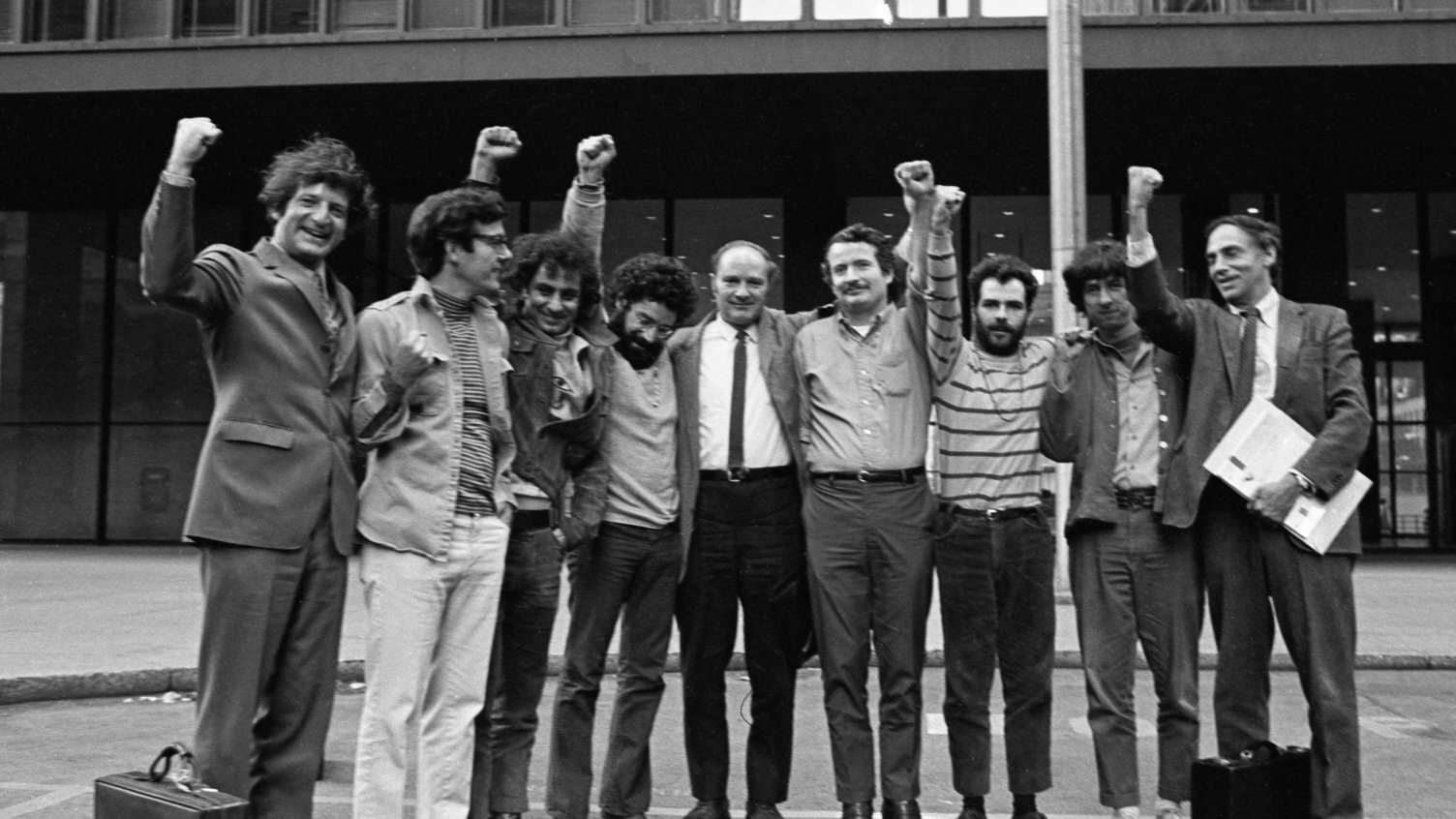Getting Woke By the Chicago Seven
A new film recounts one of the nation’s most controversial trials.
by Glenn Silber
September 24, 2020
On Wednesday, August 28, 1968, some 15,000 protesters assembled for an anti-war rally at the bandshell in Chicago’s Grant Park. Afterward, a few thousand broke off and tried marching to the International Amphitheatre, which was then hosting the Democratic National Convention.
The way the Chicago Seven and their lawyers were standing up for their right to protest the war in the face of an archconservative judge only elevated their status to us as antiwar icons.
It was the third day of the four-day convention that had seen skirmishes with some of the 12,000 Chicago police Mayor Richard Daley had enlisted to keep order in his host city. On this night, the marchers were subjected to what was later officially deemed to be “a police riot.” The Chicago police attacked the protesters with tear gas, mace, and batons. All of this was captured live by network television cameras and broadcast to the stunned eyes of the nation.
I remember watching the coverage on TV with my dad, at our family home in New Jersey.
I was eighteen years old. My father was a Newark attorney and moderate Republican supporter of Richard Nixon. As an Army Major, he had spent a year in Germany after the end of World War II to help “de-Nazify” Germany and return the judicial system to civilian rule. I could see that my father was shocked and disgusted by what he saw on TV that night. I was, too.
Little did we realize that the events we witnessed on TV that night would lead to one of the most controversial political trials in U.S. history, and the subject of a new highly anticipated political film about to be released just three weeks before the fall 2020 election.
One week later, in September 1968, my parents and sister drove me to Madison, Wisconsin, where I was enrolled as a freshman at the University of Wisconsin. The next day, someone from the Wisconsin Draft Resistance Union slipped a leaflet under my dorm room door. It invited me to a “College Disorientation Meeting” about the war in Vietnam. I went. Little did I know that it would be the beginning of my political transformation.
That winter, I took part in supporting a Black Student Strike, during which the state’s Republican governor called in the National Guard to “restore order” to Madison. Three months later, I was tear-gassed by Madison police at a community block party just off campus, which set off four nights of riots. By the end of my first year of college, I viewed the war in Vietnam as immoral, illegal, and just plain wrong. I burned my draft card.
In March 1969, President Richard Nixon’s Justice Department indicted eight individuals on charges of “conspiracy to cross state lines to incite a riot” and similar offenses, in connection with the Chicago protests. That fall, when I was back in college as a sophomore, the trial of the Chicago Eight began in a federal courtroom in Illinois. It would last for five months.
The trial, starring “Yippee” leaders Abbie Hoffman and Jerry Rubin as the movement’s counterculture heroes and court jesters, quickly turned into a political circus. The judge assigned to the case, Julius J. Hoffman (no relation to Abbie), ordered defendant Bobby Seale, co-founder of the Black Panther Party, bound, gagged, and chained to a chair, which prevented him from speaking, and denied his demand to represent himself.
Seale was held in contempt and soon separated from the other defendants, thereafter known as the Chicago Seven. Besides Hoffman and Rubin, they included Students for a Democratic Society leaders Tom Hayden and Rennie Davis, antiwar activists John Froines, a chemist, and Lee Weiner, a sociologist. Rounding out the group was David Dellinger, a conscientious objector to World War II, then in his early fifties, and a father figure to the group.
I felt that singling out these activists and indicting them for what went down at the Chicago Convention was like putting the entire Antiwar Movement on trial for Mayor Daley’s police riot. The way the Chicago Seven and their lawyers were standing up for their right to protest the war in the face of an archconservative judge only elevated their status to us as antiwar icons.
My college friends and I had to see the trial for ourselves, so we piled into my 1964 Chevy Impala in the middle of the night and drove three hours to the federal courthouse in Chicago. There we sleepily stood in line for hours to score a seat in the courtroom. We were rewarded that morning by the hilarious sight of Abbie Hoffman and Jerry Rubin showing up in court donning judges’ robes to mock Judge Hoffman’s authority over the judicial proceedings.
They had a point. Watching the trial, especially in person, it was hard not to notice that Judge Hoffman’s rulings seemed harsh and biased. He repeatedly ruled against the Chicago Seven’s legendary radical lawyers, William Kunstler and Leonard Weinglass, who it seemed didn’t win a single objection in court that morning.
That trial is the basis of a new Hollywood movie, which will premiere on Netflix on October 16. Written and directed by superstar scribe Aaron Sorkin (A Few Good Men, The West Wing, The Social Network), The Trial of the Chicago 7, based in part on court transcripts, brings us back to one of the most politically polarizing times of the Vietnam Era.
The film stars Sacha Baron Cohen as Abbie Hoffman, Eddie Redmayne (Tom Hayden), Jeremy Strong (Jerry Rubin), Yahya Abdul-Mateen II (Bobby Seale), and Frank Langella (Julius Hoffman), with other roles played by Joseph Gordon-Levitt, William Hurt, and Michael Keaton. One of the film’s producers is Steven Spielberg, who had actually suggested the project to Sorkin more than a decade earlier.
The Trial of the Chicago 7 revisits the political polarization and antiwar passions that fueled the protest movement at that particular turning point in our nation’s history. It shows the violent confrontation between the Chicago police who were turned loose on the determined youthful protesters, as the buildup to the backstory that led to the trial.
As the tension in the street outside the Democratic National Convention builds to an inevitable clash, we see and hear the protesters’ now-famous rejoinder grow, “The Whole World Is Watching”—as if that could protect the unarmed activists from the cops’ billy clubs and mace. Still, as the press notes for Sorkin’s movie remind us, “In 1968, Democracy refused to back down.” Sound familiar?
On February 11, 1970, after the courtroom proceedings had come to a close and the Chicago Seven awaited their verdict, defendants Jerry Rubin and John Froines came to speak at the University of Wisconsin–Madison’s student union.
A crowd of a thousand or more student radicals, myself included, packed the student union’s Great Hall. Rubin, who entered wearing a judicial robe, which he then tore off and stomped on, was alternately entertaining and inspiring. He characterized the trial as a struggle between the “life culture” of the United States’ burgeoning youth movement and the “death culture” of the establishment as personified by the black-robed figure of the elderly Judge Julius J. Hoffman.
“What gets the judge so uptight,” Rubin told the crowd, as preserved in an article in The Capital Times, “is that we smile and laugh” in court.
While the jury deliberated on the verdict, Judge Hoffman cited all the defendants—plus attorneys Kunstler and Weinglass—with a total of 157 contempt of court charges, imposing sentences ranging from two and a half months to four years in prison.
On February 18, a week after the Madison event, the jury acquitted the Chicago Seven of conspiracy charges. John Froines and Lee Weiner were acquitted completely, while the remaining five defendants were convicted of “crossing state lines with the intent to incite a riot.” Each drew a five-year prison sentence and a $5,000 fine.
Two years later, all the convictions were reversed by the U.S. Court of Appeals for the Seventh Circuit, which cited Judge Hoffman’s bias and the FBI’s surveillance of the Chicago Seven’s defense lawyers. The convictions for contempt of court were also overturned on appeal.
In Conspiracy to Riot, a new book on the trial published in August, defendant Lee Weiner summed up the import of the case, writing that “the most important lesson from the sixties and our trial that continues to resonate now is that people can and must resist illegitimate state power and they must help sustain a renewed political struggle for social and economic justice.”
Weiner added, “It is part of how anyone becomes their best self, a responsible citizen and patriot. That was true for me. It is true for anyone.”
Witnessing the trial of the Chicago Seven was one of many crucial turning points in my young life. I no longer had any interest in becoming an attorney, which I had grown up assuming I would be, like the rest of the men in my family. Inspired by Abbie and Jerry, I was a Yippie at heart.
I would find some other way to contribute.
Tags
POLICE BRUTALITY BLACK LIVES MATTER DEMOCRATIC PARTY CHICAGO POLICE CHICAGO SEVEN DNC MAGAZINEOCTOBER/NOVEMBER 2020 PROTEST




